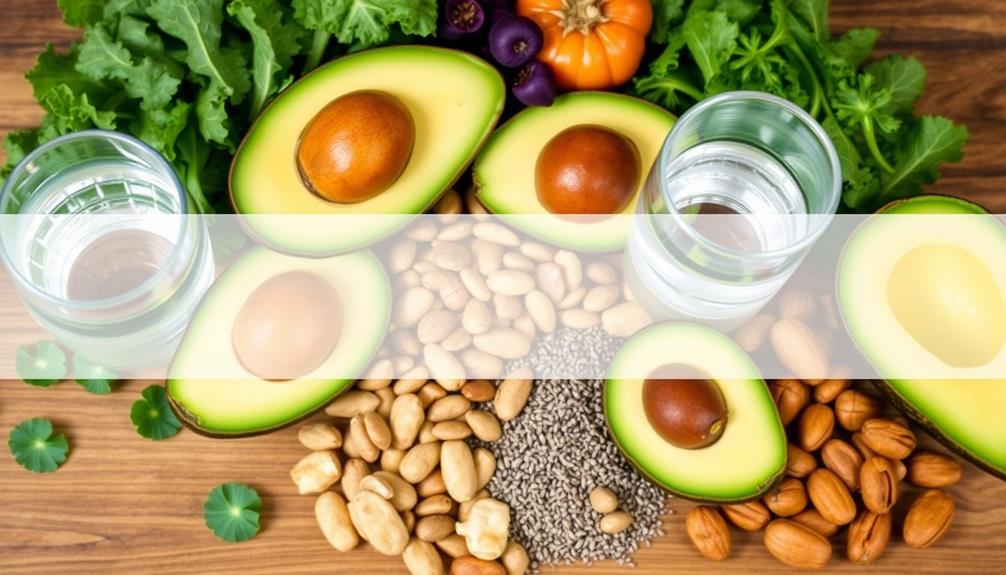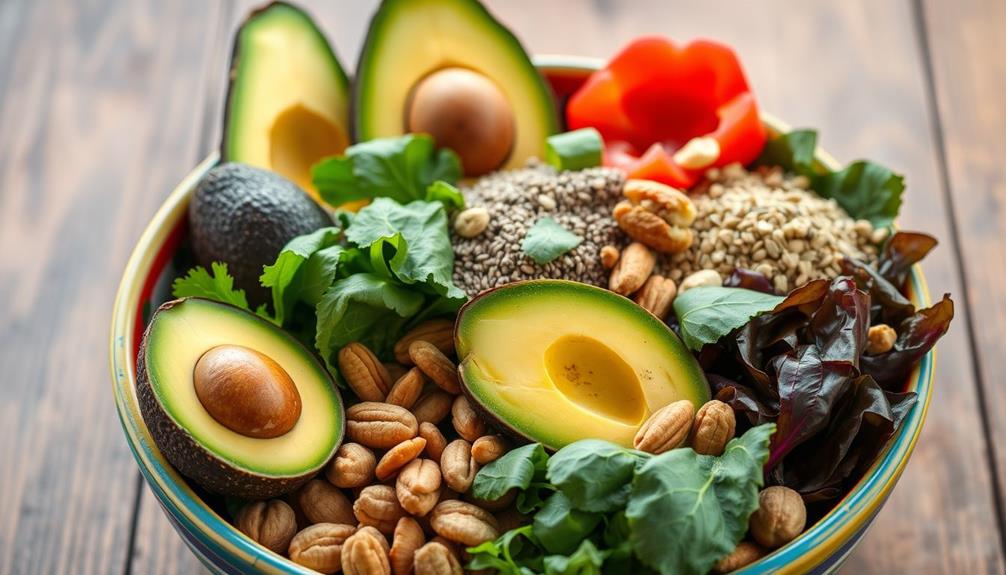To avoid constipation on the keto diet, focus on increasing your fiber intake while staying hydrated. Incorporate low-carb, high-fiber foods like leafy greens, avocados, and chia seeds into your meals. Aim for at least 25 grams of fiber for women and 38 grams for men daily. Don't forget to drink plenty of water—between 9 to 13 cups a day is ideal, especially as fiber absorbs water. Regular exercise helps kickstart your digestion, too. By making these adjustments, you can enjoy a smoother keto journey. Discover more tips to keep your gut happy and healthy along the way!
Key Takeaways
- Increase intake of low-carb, high-fiber vegetables like spinach, broccoli, and avocados to support regular bowel movements.
- Stay hydrated by drinking 9 to 13 cups of water daily, especially when increasing fiber intake.
- Engage in regular aerobic exercise, aiming for at least 150 minutes weekly, to improve gut motility.
- Consider adding fiber supplements like psyllium husk if dietary fiber sources are insufficient.
- Include probiotics from fermented foods to enhance gut health and aid digestion.
Understanding the Keto Diet

Understanding the keto diet starts with grasping its core principles. The keto diet is a very-low-carb, high-fat dietary plan that restricts carbohydrate intake to under 50 grams per day. This change induces ketosis, where your body burns fat for energy instead of glucose.
While many individuals experience rapid weight loss on the ketogenic diet, adapting can lead to digestive changes, including constipation. One major factor contributing to constipation is the significant reduction in dietary fiber. You often eliminate high-carb foods like fruits, grains, and starchy vegetables, which are rich in fiber. Without adequate fiber, your digestive health may suffer, leading to gastrointestinal symptoms such as bloating or discomfort.
To combat this, focus on incorporating keto-friendly sources of fiber, such as non-starchy vegetables, nuts, and seeds. Additionally, consider developing a budget for your grocery expenses to guarantee you're purchasing a variety of fiber-rich foods, which is essential for maintaining digestive health a budget plan.
Additionally, don't overlook the importance of hydration. Staying well-hydrated can help ease digestive issues and support overall bowel function.
Common Causes of Constipation

When you're on a keto diet, low fiber intake is a major factor that can lead to constipation. The reduction of high-carb foods means fewer sources of fiber, which your digestive system needs to function smoothly.
This issue is similar to how newborn constipation can affect infants, as both scenarios involve dietary changes impacting bowel regularity.
Additionally, dehydration is a common issue, as the increased fat and protein can cause fluid loss, further complicating your bowel movements.
Low Fiber Intake
Many people on the ketogenic diet often find themselves facing constipation due to low fiber intake. The keto diet limits carbohydrate consumption to 20-50 grams per day, which severely restricts high-fiber foods like fruits, whole grains, and starchy vegetables. This reduction leads to insufficient fiber consumption, falling short of the recommended 25 grams for women and 38 grams for men.
Additionally, a lack of dietary fiber can adversely impact your gut health, similar to how proper care is essential for pets like hamsters and birds routine health checks for signs of illness.
Without enough dietary fiber, your digestion may slow down, making regular bowel movements difficult. Fiber is essential for adding bulk to your stools and promoting regularity in your gastrointestinal tract. As you shift to a high-fat diet, changes in gut microbiota can further affect your digestive health, worsening constipation from low fiber intake.
To combat this, focus on incorporating more non-starchy, fiber-rich vegetables into your meals. Options like leafy greens, broccoli, and cauliflower can provide the necessary fiber to support your digestive health.
Additionally, don't forget the importance of water intake, as staying hydrated also aids in maintaining regular bowel movements. By making these dietary changes, you can effectively address the issues caused by low fiber intake on a keto diet.
Dehydration Issues
Dehydration can be a significant hurdle for those on the keto diet, often leading to constipation. When you enter ketosis, your body loses more water, which can result in harder stools. To combat this, you should aim for an adequate daily water intake of 9-13 cups, especially if you're increasing your dietary fiber.
The high-fat content of the keto diet can slow your digestive process, making proper hydration even more crucial for maintaining bowel regularity. Additionally, it's important to reflect on the role of cold medications overview in managing any accompanying symptoms that may arise during dietary adjustments.
Electrolyte imbalances, particularly low sodium and potassium levels, often occur during ketosis and can exacerbate dehydration. When you don't drink enough water, your digestive system struggles, worsening constipation symptoms.
It's essential to monitor your fluid intake closely while on a keto diet to prevent these issues. Make it a habit to carry a water bottle, track your hydration throughout the day, and think about adding electrolyte supplements if needed.
Importance of Dietary Fiber

One key to maintaining digestive health on a keto diet is understanding the importance of dietary fiber. Since the keto diet often limits fruits, whole grains, and starchy vegetables, you may find it challenging to reach the recommended daily fiber intake of about 25 grams for women and 38 grams for men.
To combat constipation and promote healthy bowel movements, focus on low-carb, high-fiber options like leafy greens, avocados, and nuts. Additionally, incorporating foods rich in antioxidants, such as celery juice, can further support your digestive health.
Incorporating these high-fiber foods is vital, as they add bulk to your stool and facilitate its passage through your digestive tract. A diet low in fiber can lead to constipation, negatively impacting your overall well-being.
Additionally, an adequate intake of dietary fiber supports a healthy gut microbiome, which is essential for proper digestion and nutrient absorption.
Beyond promoting regularity, dietary fiber is linked to reduced risks of colorectal cancer and better blood glucose regulation, making it an important component of your ketogenic lifestyle.
Prioritize fiber-rich choices to enhance your digestive health and enjoy the benefits of your keto journey without discomfort.
Hydration and Its Role

When you're following a keto diet, staying properly hydrated is important for preventing constipation and ensuring your digestive system functions smoothly. Adequate water intake ranges from 9 to 13 cups daily, especially as increased fiber consumption requires more hydration to avoid bloating. Fiber absorbs water in the digestive tract, so without enough fluid, you might worsen constipation.
To support your hydration, consider these options:
| Hydration Sources | Benefits |
|---|---|
| Warm or Room Temperature Water | Enhances digestion and bowel regularity |
| Herbal Teas | Provides hydration and soothing effects |
| Bone Broth | Rich in nutrients and helps maintain electrolyte balance |
Monitoring your fluid intake is essential; dehydration can lead to hardened stools and further constipation. Proper hydration maintains electrolyte balance, particularly sodium and potassium, crucial for digestive health. Don't forget to drink water consistently throughout the day, and you'll feel the positive impact on your bowel regularity and overall well-being while on the keto diet.
Low-Carb, High-Fiber Foods

Incorporating low-carb, high-fiber foods into your keto diet is essential for maintaining digestive health and preventing constipation. Non-starchy vegetables like broccoli, kale, and spinach are excellent choices, as they provide necessary fiber while keeping carbs low.
Additionally, consider integrating essential oils for digestive support to further enhance your digestive health. Aim to fill your plate with these veggies to enhance your fiber intake and support regular bowel movements.
Avocados are another fantastic option, delivering healthy fats along with about 10 grams of fiber per medium fruit. Including avocados in your meals not only boosts your fiber intake but also aids in overall digestive health.
Nuts and seeds, such as chia seeds, flaxseeds, and almonds, are also great additions. Chia seeds, for instance, offer around 10 grams of fiber per ounce, making them a powerful ally against constipation.
You can also try artichokes and Brussels sprouts, which provide about 7 grams of fiber per cup.
If you're struggling to meet your fiber goals, consider using fiber supplements designed for low-carb diets, like psyllium husk. These can help you reach your daily fiber intake without exceeding carb limits, effectively aiding in constipation prevention.
Exercise for Digestive Health

To keep your digestive system running smoothly on a keto diet, adding regular exercise can be just as important as choosing the right foods. Engaging in regular aerobic exercise—like walking, jogging, or cycling—stimulates intestinal contractions, promoting bowel movements and reducing the risk of constipation.
Additionally, incorporating practices like yoga for back pain can enhance overall digestive health. Aim for at least 150 minutes of physical activity each week to enhance your gut motility and facilitate the passage of stools.
Incorporating light resistance training or yoga can also improve your digestive function by alleviating stress and boosting blood flow to your gastrointestinal tract. One of the simplest yet effective strategies is to take post-meal walks, even if they're just 10-15 minutes long. These walks can greatly aid digestion and help manage constipation symptoms associated with the keto diet.
Maintaining an active lifestyle not only keeps your body fit but also contributes to a more diverse gut microbiome, essential for healthy digestion and regular bowel movements.
Probiotics and Gut Health

Boosting your gut health with probiotics can make a noteworthy difference, especially if you're dealing with constipation on a keto diet. Probiotics are beneficial bacteria that help restore gut health and improve digestive function. Incorporating fermented foods like kefir, sauerkraut, and kimchi into your meals can enhance the diversity of your gut microbiota, potentially alleviating digestive issues.
Additionally, understanding how emotional health can affect gut function is crucial, as conditions like Borderline Personality Disorder can lead to increased gastrointestinal distress.
Studies show that regular consumption of probiotics leads to increased stool frequency and improved consistency, which is particularly valuable on a low-fiber ketogenic diet. Strains like Lactobacillus and Bifidobacterium can specifically target constipation by enhancing gut motility and promoting regular bowel movements.
It's essential to maintain a balanced intake of probiotics, as they work best alongside adequate hydration and dietary fiber. This combination can notably contribute to preventing constipation while following a ketogenic diet.
Monitoring Electrolyte Balance

Monitoring your electrolyte balance is essential when you're on a keto diet, as it can greatly impact your digestive health. A proper balance of electrolytes, particularly sodium and potassium, is important for maintaining regularity and preventing constipation.
During ketosis, potassium levels may drop, so it's significant to incorporate potassium-rich foods like avocados and leafy greens. These foods support your electrolyte balance and promote bowel health, contributing to overall effective strategies for weight loss.
Sodium also plays a key role in hydration by helping your colon retain water, which aids in healthy stool formation. Consider adding sources like pink Himalayan sea salt to your meals to maintain your sodium levels and prevent constipation.
Additionally, don't overlook magnesium, another important electrolyte that helps relax muscles in the digestive tract. Including magnesium-rich foods such as nuts and seeds in your diet can enhance your bowel regularity.
When to Seek Medical Help

If you've been dealing with constipation for more than three days despite changes to your diet, it's time to consult a healthcare professional.
It's important to reflect on your overall health and any potential risk factors, similar to how mammography aims to detect breast cancer early for better treatment outcomes.
Severe abdominal pain or blood in your stools are serious signs that shouldn't be ignored.
Don't hesitate to seek help if you experience these symptoms; your health is a priority.
Persistent Symptoms Duration
Experiencing constipation while on the keto diet can be frustrating, but knowing when to seek medical help is crucial for your health. If you have persistent constipation lasting more than three days, it could signal an underlying issue that requires medical consultation.
Take immediate action if you notice severe abdominal pain or discomfort that disrupts your daily activities. Signs of dehydration, like dizziness or dry mouth, alongside constipation are critical indicators to consult a healthcare provider. Additionally, if you see blood in your stool or notice significant stool color changes, it's essential to seek professional advice promptly.
Lastly, chronic symptoms that don't improve with dietary adjustments or hydration could signify serious gastrointestinal conditions.
| Symptoms to Watch For | Action to Take |
|---|---|
| Persistent constipation (>3 days) | Seek medical consultation |
| Severe abdominal pain | Get medical attention immediately |
| Signs of dehydration | Consult a healthcare provider |
| Blood or significant color changes | Promptly contact a professional |
Being proactive about these symptoms can help protect your health while maneuvering the keto diet. Don't hesitate to reach out for help if you're concerned.
Severe Abdominal Discomfort
Severe abdominal discomfort can be a concerning symptom while following the keto diet, especially if it lasts more than a few days. If you experience this discomfort, it's vital to pay attention to other gastrointestinal symptoms. Signs like dizziness or dry mouth may indicate dehydration, warranting immediate consultation with a healthcare professional.
If constipation persists despite your dietary adjustments and hydration efforts, don't hesitate to seek medical advice. This could prevent complications such as hemorrhoids or bowel obstruction.
Additionally, any changes in stool color should raise a red flag. If you notice dark, red, or unusual colors, especially alongside severe abdominal pain, treat this as a significant warning sign that requires urgent evaluation.
Your body might be signaling an underlying issue, so don't ignore it. If the discomfort disrupts your sleep or daily activities, it's important to investigate further.
Taking prompt action can help guarantee proper management and alleviate your symptoms. Remember, your health is paramount, and addressing severe abdominal discomfort early on can prevent more serious complications down the road.
Blood in Stools
Noticing blood in your stools can be alarming and shouldn't be taken lightly, especially while following a keto diet. Blood in stools can indicate serious health issues, such as hemorrhoids or gastrointestinal bleeding. If you see bright red streaks or dark, tarry stools, seek medical attention immediately.
Persistent bleeding or changes in stool color signal potential complications related to your diet, including dehydration or digestive strain from low fiber intake. These symptoms shouldn't be ignored. If you experience severe abdominal pain, dizziness, or signs of dehydration alongside blood in your stools, it's essential to consult a healthcare provider without delay.
Dietary changes can impact your gastrointestinal health considerably, and being on a restrictive diet like keto requires extra vigilance. Regular check-ups are vital, as early detection of issues can help you avoid more serious health concerns.
Frequently Asked Questions
What Helps Constipation on a Keto Diet?
To ease constipation, focus on increasing fiber intake, staying hydrated, and engaging in light physical activity. Incorporate low-carb, high-fiber foods, and monitor your electrolyte levels to support healthy digestion and bowel movements.
How Do I Firm up My Poop on Keto?
To firm up your poop on keto, focus on getting enough fiber from low-carb sources, stay hydrated, add electrolytes, exercise regularly, and include probiotics in your diet for a healthier digestive system.
Is Constipation a Side Effect of Ketosis?
Did you know up to 50% of people experience constipation when starting ketosis? Yes, it's a common side effect due to lower fiber intake and dietary shifts. Staying hydrated and adjusting fiber can help!
How to Get Enough Fiber While on Keto?
To get enough fiber while on keto, focus on low-carb vegetables like spinach and broccoli, add high-fiber foods like avocados and chia seeds, and consider fiber supplements to help meet your daily goals.
Conclusion
Staying regular on a keto diet is totally achievable with a few simple adjustments. You might think cutting carbs means losing fiber, but there are plenty of low-carb, high-fiber options to keep things moving. By staying hydrated, exercising, and incorporating probiotics, you can support your digestive health effectively. If you do encounter issues, don't hesitate to tweak your diet or seek advice. Remember, your gut health is key to thriving on keto, so prioritize it!









